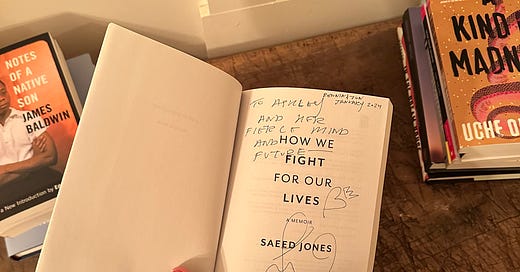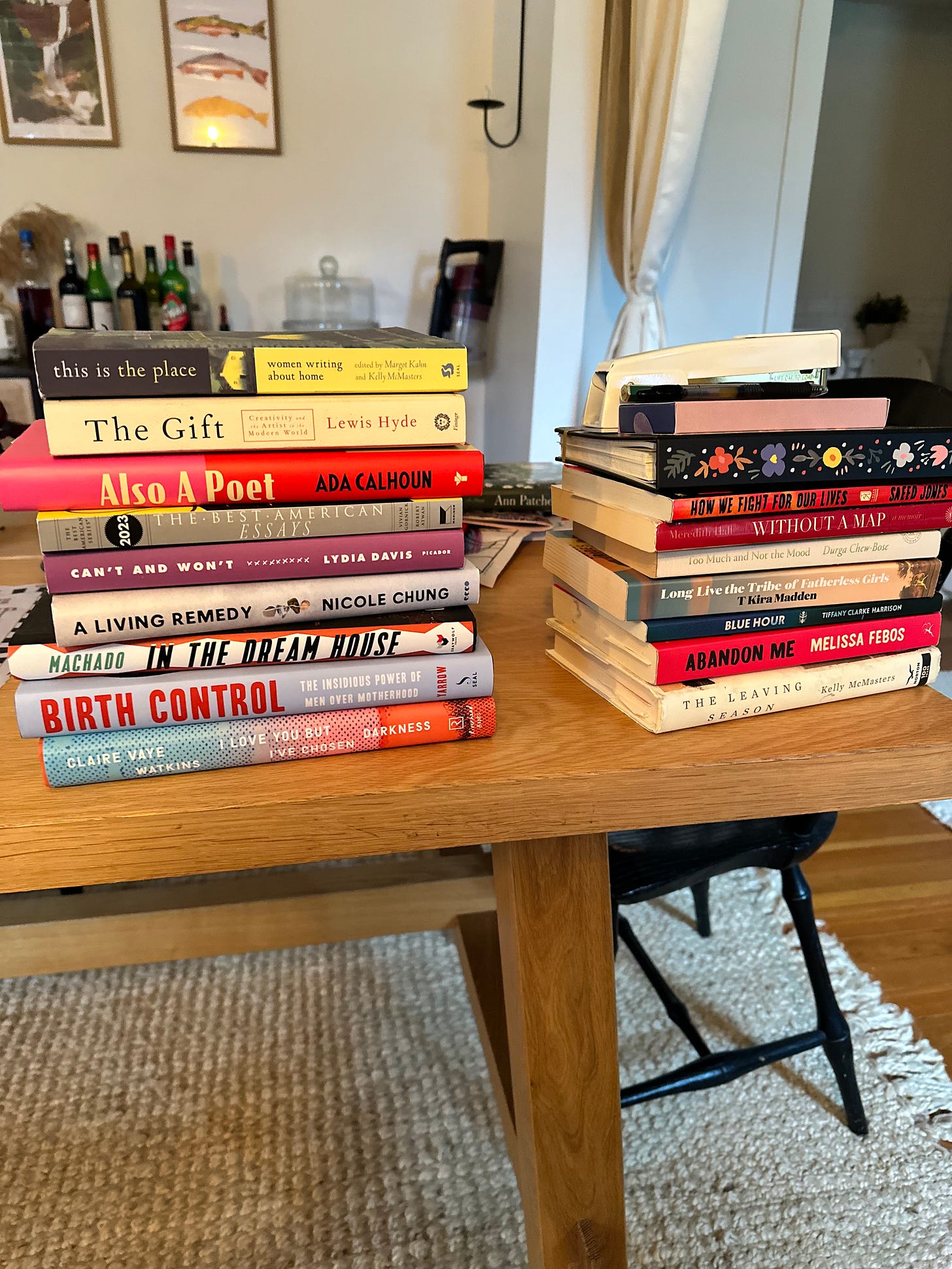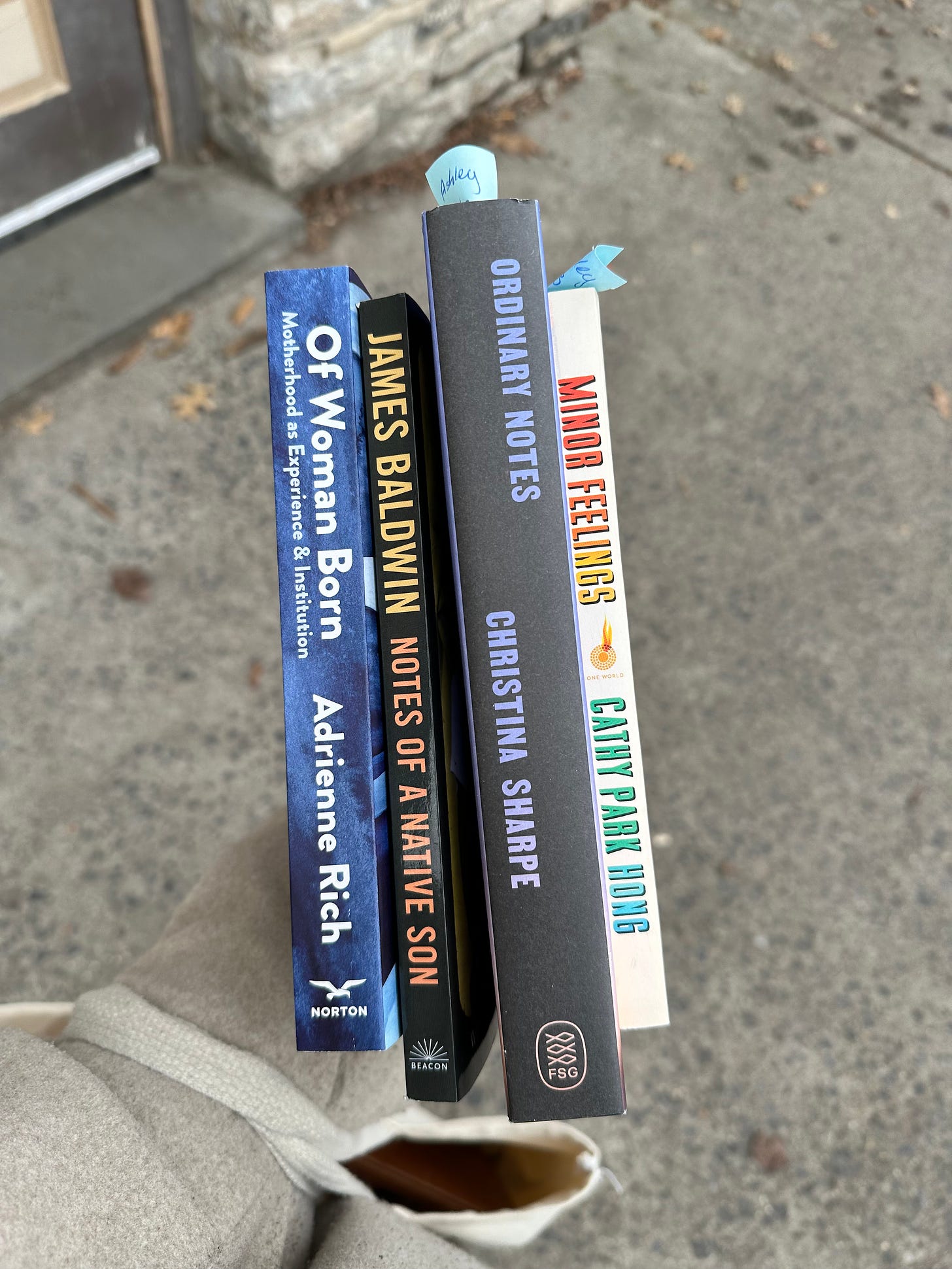Lately, I’ve felt very unsettled by my reality:
I have everything I’ve ever wanted.
Every goal or dream I’ve aspired to has come to fruition. The partner, the family, the house in the woods, the career, the friendships scattered around the world. I’ve been writing and rewriting my way around the idea of settling. The craving I’ve held most of my life thus far to “settle down.” I’ve been feeling this urge in its literal meaning “to be seated”— to sit and chill out and enjoy the ride that is my life — and in its referred meaning of acquiring a “secure” lifestyle — which bring up other questionable words for me like permanence and established, words that make me feel both lustful and detached.
A few months ago, my friend came into the bookshop while I was working and jokingly asked for what he called a “literary intervention.” He said he couldn’t get caught up in any of the books he had tried to read for the last few months. When he told me the current book on his nightstand was David Grann’s The Wager I was like, well no shit. That book is huge. Not exactly a rapid fire novel. But the subject matter, he argued, was fascinating to him. He really wanted to know more about it, but he wasn’t so captivated that he couldn’t put the book down. Often, it would put him to sleep, which clearly frustrated him.
David Grann wrote some other bangers like The Lost City of Z and Killers of the Flower Moon, both of which became major motion pictures. I recently watched the latest one, Killers of the Flower Moon, knowing it was going to be an Oscar contender (three hours long + Leo DiCaprio = sad algorithm for award wins) and this writerly obsession I’ve had for the word settle struck something deep within me as I watched these actors’ portrayal of historical events, stealing land and wealth that was never truly theirs. I had to ask myself, am I taking something in this life that doesn’t or shouldn’t belong to me?
Having grown up in Los Angeles with a white single mother, I’ve essentially “passed” as white my whole life. I’ve believed the fable that it’s easier to ignore the people, places, and ideas I don’t know about, and for a huge chunk of my life, that included my father. My father immigrated to the US from Mexico, and while I hold a lot of varied narrative threads for the reasons he wasn’t a part of my upbringing, the one that rings loudest to me is my mother’s fear. Fear that he would take baby-me to Mexico to meet his family and never return.
A mother’s fear for her child runs deep, I know this now. I’m revisiting this ideology as I prepare to interview a past writing mentor of mine, Rachel Lyon, about her forthcoming book Fruit of the Dead. The book is a modern reimagining of Greek mythology characters Persephone and Demeter, a story about a fiercely protective mother and her young daughter who captures the likes of Hades and, being young and impressionably unsure of herself, falls in love with all he has to offer her. The settlement or agreement that they come to (though I wouldn’t doubt there are multiple versions), is to have Persephone spend half the year with her mother Demeter and half the year with her husband Hades. Much like a child growing up with divorced parents. The cold, desolate months of autumn and winter are said to be a reflection of the months Persephone spent away from her mother, the goddess of earthly harvest.
Growing up I very rarely fought with my mother. When I did, it usually had something to do with our frequent moves in and out of various apartments, or decisions that were made without consulting one another. One of the arguments we had I vaguely remember in detail but what’s seared in my memory was yelling at her for not keeping us in one place long enough. For her inability to provide a permanent residence, a home we owned. I was upset by our lack of settlement. I must have been around 12 saying this, and I remember feeling that I had spoken to some deep insecurity of hers, or added too much pressure on her— that what I said was not fair. I also remember thinking I’d have to wait until I had more agency over my life to do things differently. Though in pursuit of settling down, I haven’t been able to stop moving for very long. Funny how that happens.
I would guess circa age twelve, being in sixth grade, that I was learning about early civilizations. That colonization had already seeped its way into my young and impressionably unsure-of-myself mind. That I was yearning to reflect the white, well-to-do two-parent-households surrounding us, to claim what everyone else seemed to have and call it mine.
Nearly all of my writing right now is centered around these thematic ideas that I’ll call cultural myths. Challenging the narratives I’ve internalized my entire existence and really pressing into if the answers are scripted, learned, inherited, or honest. Are they mine? There’s been a lot of reckoning: Did I really want to become a mom or was I programmed to believe that’s a part of what success means for a woman? A lot of coming to terms with facts that I’ve never allowed to settle into my consciousness: I am the daughter of an immigrant. A lot of facing my own maternal fears: Who protects us?
What has become clear to me during my many months of silence in this digital space is that what I read and what I write are intrinsically linked. If I’m reading a book because I have to (for work purposes), sometimes that’s enough of a buzz kill. If I’m reading something because the press hype can’t be ignored any longer, there’s a fifty percent chance my mind is already seeking ways to oppose the popular opinion and thereby ruin my chances of falling in love. But just like love, or any good relationship, really, reading can’t be forced. It’s about timing. It’s knowing when to move on, when to leave things on a good note. It’s learning how to keep showing up, even when things feels hard, or put you to sleep (ahem, what’s up Jason).
These dreaded winter months have been filled with weather-related school closures, back-to-back illnesses, and a disorienting barrenness (damn you, Demeter!). It is also a time of learning to relish in the darkest days of my life, because my darkness is inoculated by privilege. I’ve always declared myself a reader, but claiming myself a writer has felt precarious. The fiscally dire landscapes of literature hold their own deprivations. Though if my own history has taught me anything, the assertion must come before the declaration.
Settle Into A Good Book
Here’s a 2023 annual reading round-up I contributed to, and below is a list of what I’ve read so far this month.
Minor Feelings: An Asian American Reckoning by Cathy Park Hong
I devoured this in two days. A well blended portrait of personal narrative and criticism. As an essayist, reading this left me in a paradox of desiring to be more critical in my own work while also finding criticism easily falls into the trap of becoming a total drag.
On Immunity: An Inoculation by Eula Biss
First off, getting to workshop with Eula at my very first MFA residency was profound. Her commentary has been immensely helpful on my generative process. This is the second book of hers I’ve read and the biggest shock of it all is that her description of H1N1 has much in common with Covid. I have yet to fully reflect and decompress this book but as always, she has inspired a whirlwind of thought.
Tom Lake by Ann Patchett
I was surprised to learn: I was ashamed to be reading this novel at the start of the year! It was just so… fluffy. I read the end at a much faster pace, maybe because the story grew more interesting or maybe because I was isolating in a dorm room with Covid. Patchett is prolific. I don’t know what else to say.
How We Fight For Our Lives by Saeed Jones
My first term teacher, ladies and gents. So proud to say it. If Eula Biss was the thought-provoker of the classroom, Saeed was the heart. His comments, his story, his way of interpreting the world gets me all stirred up. Saeed is wildly talented and I feel immensely lucky to be working with him over the next few months.
Best American Essays 2023 Anthology edited by Vivian Gornick
If you enjoy personal essays or memoir and the ability to read in short snippets at a time without getting lost, anthologies like this will make you feel right at home. There are soooo many gems in here. Highly recommend.
I haven’t yet figured out how to work fiction into my routine with the MFA curriculum on my plate. I’ve downloaded the below books as audio, though I doubt I’ll be able to find contentment without seeing the words on the page. Here’s what’s in my Spotify queue:
The Vaster Wilds by Lauren Groff
Demon Copperhead by Barbara Kingsolver
Beautyland by Marie-Helene Bertino
Beauty 411
Welcome to winter. It’s dry AF. Electric heaters. Wood stoves. Air purifiers. Humidifiers. Germs. This is the winter vortex that actually makes my skin cringe. Weleda Skin Food is THEE holy grail. I put all my skin care routines aside— goodbye fancy serums! — and use their body butter, night cream, and basic moisturizer for nearly every inch of me.
Speaking of dry, your scalp feels it, too. This is when my text messages from friends across the US start reeling in with concerns of dandruff. I recently received this new scalp scrub/ shampoo duo from R+Co that instantly stopped my flaky residue the next day. Though I will admit, I probably need it once every 1-2 weeks. And a little scalp massager would probably be a really great idea, but I’m not there yet.
Shower head filters. Especially if you’re west coast. You need one of these. Water is hard and it can cause havoc on the state of your hair and skin.
I found the most incredible leave-in conditioner. It smells sexy in that beloved boho-sandalwood kind of way. It smooths but is lightweight. I am in love with the way it enhances my waves.
x, AR








Wow. So many great thoughts here. I especially loved the comparison of Demeter/Hades as divorced parents. It’s an obvious comparison (and maybe one that is made often?), but I had never linked the two.
Love the recommendations for books and hair! Keep ‘em coming!